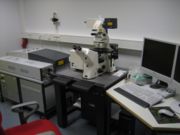MTZ01 - Zeiss LSM 510
From BioDIP
(Difference between revisions)
| Line 10: | Line 10: | ||
|width="25%"| '''features''' | |width="25%"| '''features''' | ||
|-valign="top" | |-valign="top" | ||
| − | | inverted stand, manual XY stage | + | | inverted stand, manual XY stage, motorized Z-drive, fluorescence, transmitted light with manual DIC |
| laser (nm): 405, 458, 488, 514, 561, 633 | | laser (nm): 405, 458, 488, 514, 561, 633 | ||
| point scanner, 3 confocal PMTs, T-PMT, dichromatic mirrors for excitation/emission splitting, emission filters for detection range selection, pinhole for each detector | | point scanner, 3 confocal PMTs, T-PMT, dichromatic mirrors for excitation/emission splitting, emission filters for detection range selection, pinhole for each detector | ||
| simultaneous imaging, sequential imaging, line scan, point scan, Z stacks, time-series, advanced time-series, averaging, summarizing | | simultaneous imaging, sequential imaging, line scan, point scan, Z stacks, time-series, advanced time-series, averaging, summarizing | ||
|} | |} | ||
Revision as of 16:50, 4 June 2008
MTZ Imaging - [01] Zeiss LSM 510
MTZ, B20.001B
Our Zeiss LSM 510 is designed for routine work and dedicated for high resolution imaging in XYZ. The laser lines are well distributed over the spectrum and especially good for common dye combinations. Due to the conventional setup, it's straight forward to work with.
| microscope | excitation | detection | features |
| inverted stand, manual XY stage, motorized Z-drive, fluorescence, transmitted light with manual DIC | laser (nm): 405, 458, 488, 514, 561, 633 | point scanner, 3 confocal PMTs, T-PMT, dichromatic mirrors for excitation/emission splitting, emission filters for detection range selection, pinhole for each detector | simultaneous imaging, sequential imaging, line scan, point scan, Z stacks, time-series, advanced time-series, averaging, summarizing |
